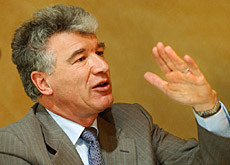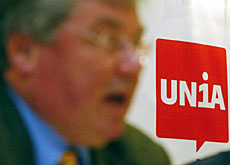Employers see May 1 as “social barometer”

May 1 is International Labour Day, when even Switzerland’s social calm is sometimes threatened by violent demonstrations.
In an interview with swissinfo, Peter Hasler, the director of the Swiss Employers’ Association, gives his take on relations between employers and employees.
The country has long enjoyed a reputation for high wages combined with an unusually strike-free environment.
However, there are signs that the climate is changing. Last year saw the merger of four trade unions to form the largest-ever such body, Unia.
The move, which came against the background of some unusually heated labour disputes, sparked speculation that labour relations may be one more area where Switzerland is increasingly coming to resemble the rest of the world.
swissinfo: What does the May 1 mean for you?
Peter Hasler: Labour Day is an occasion to reflect on the value of work and on the [labour market] situation and to discuss these issues in a forward-looking way. The key question is what it means to have – or not to have – work.
swissinfo: It is generally perceived as a sort of “class combat day”. Do the employers use this as an early warning signal or do they choose not to listen?
P.H.: May 1 is a sort of “social barometer” for us and we listen very carefully, even if we do not respond immediately. It provides a glance into the future, where the issues are – or should be – more fundamental than a Swiss franc here or there in wages. We don’t need May 1 for that.
swissinfo: That presupposes that both sides are ready for dialogue. Is that still the case?
P.H.: Dialogue always was and still is possible, even if we hear the odd discordant note. Indeed, it takes place on thousands of occasions – we have about 700 general employment contracts in Switzerland. There are sectors where it is relatively genteel, and there are others where the tone is more strident. This has been the case for a long time. Also, there were times in the past when negotiations were more violent than they are today.
swissinfo: Cost-cutting is now a universal theme and can also mean job cuts. Do employers support this trend with its negative effect on consumption?
P.H.: We support cost-cutting. However, the term is misleading, because public spending is actually increasing all the time. So it is actually a question of preventing further increases. Already today citizens work about six months per year just to pay for state and social spending. What we do not blindly support, however, is cutting public staff and salary levels.
swissinfo: The multimillion-franc salaries of some managers have become a big issue, particularly as most employees haven’t seen their wages rise.
P.H.: Employees have seen their wages rise in recent years, but not to the same extent as the top dogs at large international firms. The salary progression there in recent years really is striking. If you look at managers in the small and medium-size Swiss companies, though, the gap has not increased so noticeably as in the “Champions League”. That worries us, as politicians might step in, and we don’t want that. The shareholders of the firms in question should solve these problems.
swissinfo: More and more jobs are being moved abroad and workers here are scared they will be next. Is this inevitable?
P.H.: Yes, it is. This transformation from an industry to a service economy has been going on for 100 years. In Switzerland today, we still only produce absolute top-quality, value-added items. Jobs that do not meet this criterion disappear – it is an ongoing [natural] selection process. The advantage is that the best jobs stay here and – as several surveys show – the process is good for the Swiss economy as a whole. The million or so jobs we have created abroad also help create new jobs here.
swissinfo: We will soon vote on the free movement of people to and from new EU member states. Would you support a minimum wage in Switzerland, to allay fears of wage dumping?
P.H.: We are in favour of the so-called supporting measures. This would make it possible – I stress possible – to introduce minimum wages. But we could not do so in advance. Possibly there will be no wage dumping, because not so many more workers will come to Switzerland.
Also, the six per cent or so of abuses we have discovered to date concern not only wage dumping, but black market labour, work permits and labour laws. There will always be abuses, just as there are always people who abuse road traffic laws – we don’t ban driving as a result.
swissinfo–interview: Urs Maurer
Peter Hasler:
1946: born in Neuhausen.
1971: gained PhD in law at Zurich University.
1971: joined Meilen district court as an auditor.
1974-93: secretary and then director of the Swiss machine industry’s employers’ association.
1993- : director of the Swiss Employers’ Association.

In compliance with the JTI standards
More: SWI swissinfo.ch certified by the Journalism Trust Initiative


You can find an overview of ongoing debates with our journalists here. Please join us!
If you want to start a conversation about a topic raised in this article or want to report factual errors, email us at english@swissinfo.ch.